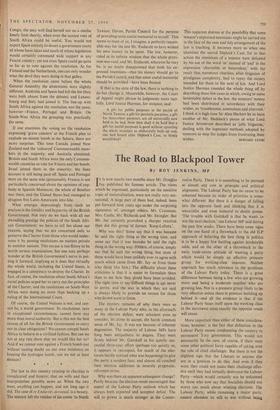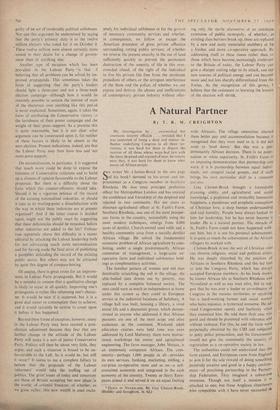The Road to Blackpool Tower
By' ROY JENKINS, MP
IT is now nearly two months since Mr. Douglas Jay published his famous article. The views which he expressed, particularly on the sensitive topic of nationalisation, were not really very sen- sational. A large part of them had, indeed, been put forward nine years ago under the surprising signatures of, amongst others, Mr. Crossman, Mrs. Castle, Mr. Richards and Mr. Swingler. But Mr. Jay certainly provoked a sharper reaction than did this group of former 'Keep-Letters.'
Why was this? Some say that it was because he said the right thing at the wrong time, and some say that it was because he said the right thing in the wrong way. (Others, of course, simply say that he said the wrong thing, but most of these would have been unlikely ever to agree with much which came from Mr. Jay or from those who think like him.) The difficulty about these criticisms is that it is easier to formulate them than to see how they could have been avoided. The right time to say difficult things is apt never to arrive, and the way in which they are said is always likely to provide an excuse for those who do not want to listen.
The mystery remains of why there were so many in the Labour Party who, in the aftermath of the election defeat, were reluctant even to consider, let alone to accept, the harsh common sense of Mr, Jay. It was not because of inherent dogmatism. The majority of Labour MPs have long been antipathetic to dogma. They were firmly behind Mr. Gaitskell in his quietly suc- cessful three-year effort (perhaps too quietly so, it appears in retrospect, for much of the elec- torate hardly noticed what was happening) to give the party a modern face; and almost all couched their election addresses in severely pragmatic, reformist terms.
Why was there an apparent subsequent change? Partly because the election result encouraged that aspect of the Labour Party outlook which has always both expected and accepted defeat. The will to power is much stronger in the Conser- vative Party. There it is something to be pursued at almost any cost in principle and political alignment. The Labour Party has no cause to be ashamed because its order of priorities is some- what different. But there is a danger of falling into the opposite fault and thinking that it is unsocialist and even immoral to desire power. 'The trouble with Gaitskell is that he wants to win the next election,' one Labour MP said during the past few weeks. There have been some signs on the one hand of a throwback to the old ILP approach of believing the best thing in politics is to be a happy few battling against intolerable odds, and on the other of a throwback to the early trade-union attitude of wanting a party which would be simply an effective pressure group for working-class interests. Neither approach has much, relevance to the problems of the Labour Party today. There is a great difference between being a few who are growing more and being a moderate number who are growing less. Nor is a pressure group likely to be very effective unless there is pressure building up behind it—and all the evidence is that if the Labour Party bases itself upon the working class in the narrowest sense exactly the opposite result will ensue.
More important than either of these considera- tions, however, is the fact that defeatism in the Labour Party means condemning the country to permanent Tory government. This would not necessarily be the case, of course, if there were some other political force capable of taking over the role of chief challenger. But there is not the slightest sign that the Liberals or anyone else are in a position to do this. And even if they were, they could not make their challenge effec- tive until they had virtually destroyed the Labour Party—which would certainly not be welcomed by those who now say that Socialists should not worry too much about winning elections. The Labour Party, while remaining a major party, cannot abandon its will to win without being
guilty of an act of intolerable political selfishness. Nor can this argument be undermined by saying that the party's primary duty is to the twelve million electors who voted for it on October 8. These twelve million were almost certainly more united in their desire for a change of govern- ment than in anything else.
Another type of escapism which has been prevalent in the Labour Party /is that :f believing that all problems can be solved by im- proved propaganda. This sometimes takes the form of suggesting that the party's leaders should light a three-year and not a three-week election campaign—although how it would be remotely possible to sustain the interest of most of the electorate over anything like this period is never explained. Sometimes, again. it takes the form of attributing the Conservative victory : the lavishness of their poster campaign and the weight of their press support. As a premise this is quite reasonable, but it is not clear what argument can he constructed upon it, for neither of these factors is likely to be absent at the next election. Present indications, indeed, are that the Labour Party may then have less and not more press support.
On nationalisation, in particular, it is suggested that much more could be done to expose the falseness of Conservative criticisms and to build up a climate of opinion favourable to the Labour proposals. But there is a difficulty, about the form which this counter-offensive should take. Should it be a vigorous defence of the record of the existing nationalised industries, or should it take as its starting-point a dissatisfaction with the way in which these industries are at present organised? And if the latter course is decided upon, might not the public react by suggesting that these deficiencies should be remedied before other industries are added to the list? Tribune rose supremely above this difficulty in a recent editorial by attacking the Labour leadership both for not advocating much more nationalisation and for having made the fatal error of publishing a pamphlet defending the record of the existing public sector. But others may not be attracted by quite this degree of compass-boxing.
Of course, there is great room for an improve- ment in Labour Party propaganda. But it would be a mistake to assume that a qualitative change is likely to occur at all quickly. Improving one's propaganda is rather like reforming one's charac- ter. It would be nice if it occurred, but it is a good deal easier to contemplate than to achieve; and it would certainly be unwise to count upon it before it has happened.
Beyond these forms of escapism, however, many in the Labour Party may have resisted a post- election adjustment because they fear that -any further change in the attitude of the Labour Party will make it a sort of junior Conservative Party. Politics will then be about very little, they argue, and such a situation is bound to be un- favourable to the Left. So it would be, but will it occur? It seems to me a complete fallacy to believe that the proposals of the Labour 'reformers' would take the stuffing out •of politics. The great issues of today and tomorrow are those, of Britain accepting her new place :n the world; of colonial freedom; of whether, as we grow richer, this' new wealth is used exclu- sively. for individual selfishness or for the gro%k th of necessary community services and whether, in consequence, we follow or escape the American precedent of great private affluence surrounding rotting public services; of whether we reverse the present anarchy in the use of land sufficiently quickly to prevent the permanent destruction of the amenity of life in this over- crowded island; of the right of the individual to live his private life free from the intolerant prejudices of others or the arrogant interference of the State and, the police; of whether we can expose and destroy the abuses and inefficiencies of contemporary private industry without offer- ing only the sterile alternative of an Indefinite extension of public monopoly; of whether, .ts existing class barriers break up, these are replaced by a new and nasty materialist snobbery or by a fresher and more co-operative approach. 13v addressing itself to these issues rather than to those which have become, increasingly irrelevant to the Britain of today, the Labour Party can give a sharper cutting edge to its attack, can tap new sources of political energy and can become more and not less sharply differentiated from the Tories. As the recognition of this grows, I believe that the resistance to learning the lessons of the election will shrink.



























































 Previous page
Previous page